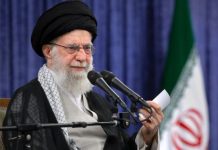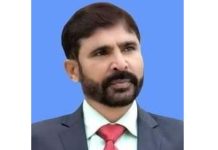Muhammad Irfan
To understand political ideologies like secularism, liberalism, and the left-right divide is most important and crucial in today’s polarized world. These frameworks shape governments, societal values, and individual freedoms, influencing global trends and local dynamics. This column provides you with the origins, importance, and relevance for a clear understanding. Firstly, I will discuss the ideologies of secularism and liberalism.The term “secular” comes from the Latin phrase meaning “of this world,” emphasizing its focus on temporal matters. A secularist is a person who believesin those principles, while a mundane kingdom separates faith from governance. Secularism is defined as the principle of seeking to conduct human affairs based on naturalistic considerations, uninvolved with religion. It is most commonly thought of as the separation of religion from civil affairs and the state and may be broadened to a similar position seeking to remove or to minimize the role of religion in any public sphere.In political terms, secularism is a movement toward the separation of religion and government, often termed the separation of church and state. This can refer to reducing ties between a government and a state religion, replacing laws based on religion with civil laws, and eliminating discrimination on the basis of religion. Secularism has existed since ancient times. Limited secularism was practiced in societies such as ancient Greece, where religion was not included in governance, but religion was still prevalent in public life. Secularism emerged in early modern Europe. Functional differentiation transformed religion from a dominant lens for interpreting reality to simply another approach to explanation. The first use of the word “secularism” in a modern sense was by the British writer George Holyoake in 1851. He coined a term that would describe a stance advocating for conducting life based on naturalistic (secular) considerations only, but without necessarily rejecting religion, thus enabling cooperation with believers. Many European countries began to undergo societal secularization during the 20th century, with levels of belief and practice declining.Secularism allows freedom for each believer and non-believer, giving people the right to follow or not follow a religion without any interference. It protects spiritual ideals and traditional values while ensuring equality in politics, education, and law. Often misunderstood as atheism, secularism does not reject beliefs in God; rather, it helps the coexistence of all beliefs. Secularism works to create a non-violent society where human beings of all religions or none can live without discrimination. It prohibits the government and institutions from favouring or discriminating against any faith or worldview. Secularism’s essential aims are to separate government decisions from spiritual influence, eliminate religious laws from public governance, and assure freedom of thought and conscience.
Liberalism as ideology defined by Wikipedia, Liberalism is a political and moral philosophy based on the rights of the individual, liberty, consent of the governed, political equality, right to private property and equality before the law. Liberalism emerged as a response to the religious conflicts and authoritarianism that marked Europe in the 16th and 17th centuries. Thomas Hobbes and John Locke are among the philosophers who established it on the principles of social contract and government based on public consent, rather than divine or religious authority. Locke was a strong advocate for the rights to life, liberty and property, which became central to classical liberalism. Enlightenment philosophers like Montesquieu and Voltaire further developed the concepts of separation of powers, freedom of expression, and individual rights. These principles played a crucial role in the revolutionary movements of America and France, where liberalism was closely linked to democracy and the rule of law. Modern liberalism aimed to counteract social inequality by advocating for limited government intervention to ensure public welfare while maintaining individual liberty. It emphasis on balance social welfare with free market. In this form of liberalism, the government was involved in providing services like education and health care to equalize social status without compromising individual freedom.Liberalism has played a significant role in shaping the development of civil rights movements, constitutional laws, and electoral processes globally over time. It stresses the importance of individual liberty, political equality, and the right to private property, which is at the core of many democratic institutions. Conversely, the execution of liberal concepts varies across regions and is affected by various factors such as culture history, economics, and geography. Modern political thought is rooted in liberalism, which has been flexible and adaptable to the changing world.
Now, I discuss the concepts of left-wing and right-wing politics, exploring their principles and their impact on governance and society.During the French Revolution (1789-1799), left-wing and right-wing politics emerged because members of the National Assembly were allocated seats based on their political affiliations. Those who supported revolutionary changes and opposed the hierarchical structures that underpinned modern society, while those defending traditional institutions and hierarchical structures occupied the right occupied the left seats. Over time, these terms came to represent a broader ideological spectrum in politics worldwide.
Left wing political parties support social equality and government intervention in the economy, along with progressive measures to decrease inequality. Socialism and social democracy are among the leftist ideologies that prioritize welfare over personal wealth. In the past, leftist movements like union labour, civil rights campaigns and feminist struggles have been allied with it. Presently, the focus of left-wing policies includes universal healthcare access, free education, labour rights, and environmental sustainability. The left-wing political party in Pakistan is considered to be the Pakistan Peoples Party (PPP), attributed to its socialist policies and pro-worker stances under the vision of its visionary leader, Zulfikar Ali Bhutto. However, critics argue that over time, the Peoples Party’s policies have drifted, reflecting more centrist approaches.Other known left wing socialist political parties is “Mazdoor Kissan party lead by Dr. Tamiur-ur-Reman.”On the other hand, right-wing politics prioritize individual freedom, minimum government intervention, and the preservation of cultural and historical values. Right-wing movements, which are associated with capitalism, nationalism, and conservatism, advocate for free markets in exchange for private property rights, a strong national identity, as well as other liberties. Deregulation, lower taxes, and stricter immigration controls are commonly promoted by right-wing politics in practice. Right-wing ideology are common among mainstream political parties in Pakistan, including the PML-N and PTI. They prioritize market driven economic policies, privatization, national security, and the maintain of their traditional, cultural and religious values, etc. There are also other prominent groups and religious organizations, such as Jamaat-e-Islami and Jamiat Ulema-e-Islam that have a strong focus on policies related to religious nationalism and conservatism.Politically, the line between left and right is blurred in Pakistan’s politics; parties sometimes adopt policies from both sides to attract a different set of voters because, in such a dynamic, the challenges of society and economy intersect with those of ideology in addressing different cultural and political segments of the nation.












